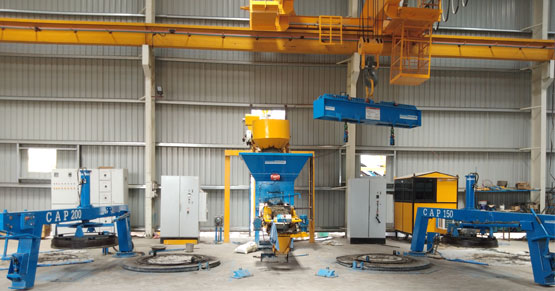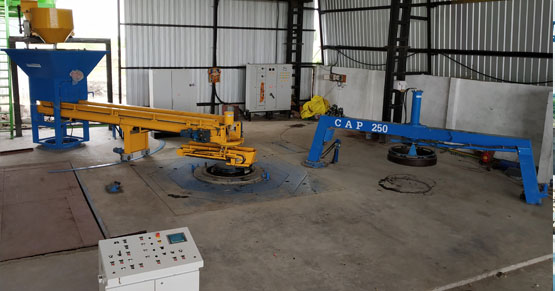Table of Contents
India’s infrastructure development has historically centered on metropolitan areas, but the focus has shifted in recent years to Tier-2 and Tier-3 cities. These smaller cities, often considered the backbone of India’s growth, are experiencing a surge in Concrete Pipe Machines.
This growth has led to an increasing demand for concrete pipe machines, a critical component in the construction of drainage systems, sewage networks, and water management projects. This article explores how Tier-2 and Tier-3 cities are driving this demand and examines the role of concrete pipe machine manufacturers and suppliers in meeting these requirements.
The Growing Demands of Tier-2 and Tier-3 Cities
Urbanization and Development
As more people migrate from rural to semi-urban areas, Tier-2 and Tier-3 cities are witnessing significant urbanization. Cities like Lucknow, Jaipur, Coimbatore, and Bhubaneswar are investing in:
- Modern sewage and drainage systems.
- Affordable housing projects under government schemes like Pradhan Mantri Awas Yojana.
- Industrial parks and special economic zones.
This development necessitates the use of high-quality concrete pipes, boosting the demand for concrete pipe machinery.

Government Initiatives
Policies such as the Smart Cities Mission aim to improve urban infrastructure. These programs prioritize water management, waste disposal, and sanitation systems, all of which require durable concrete pipes.
Reliable Infrastructure Solutions
Concrete pipes are essential for building reliable and long-lasting infrastructure. The precision offered by modern concrete pipe machines ensures the production of durable pipes that can withstand environmental stresses and heavy loads.
Cost and Time Efficiency
Tier-2 and Tier-3 cities require cost-effective and efficient solutions to meet their growing infrastructure needs. Automated concrete pipe making machines enable high-speed production with minimal labor, reducing overall project costs.
Customization for Local Needs
Each city has unique requirements based on its geography, climate, and population density. Concrete pipe machine manufacturers offer customizable solutions to produce pipes tailored to specific applications, such as drainage systems for flood-prone regions.
Applications of Concrete Pipes in Smaller Cities
Sewage and Drainage Systems
Proper sewage and drainage systems are critical for maintaining public health and managing wastewater. Concrete pipe manufacturing processes produce leak-proof and durable pipes, ensuring efficient waste disposal in smaller cities.
Irrigation Projects
In regions where agriculture is a primary livelihood, concrete pipes are used for irrigation channels to ensure water is distributed efficiently to farmlands.
Industrial Development
The establishment of industrial parks in Tier-2 and Tier-3 cities requires robust infrastructure, including pipelines for transporting industrial waste and water.
Road and Rail Connectivity
Concrete pipes are also used in culverts and underpasses for roads and railways, essential for improving connectivity in these cities.
Features of Concrete Pipe Machines in Tier-2 and Tier-3 cities
Automation
Modern concrete pipe making machines incorporate automated features to minimize manual labor and reduce errors.
Versatility
These machines can produce pipes of varying sizes and shapes, catering to diverse infrastructure needs.
Energy Efficiency
Energy-efficient machines help reduce operational costs, making them ideal for budget-conscious projects in Tier-2 and Tier-3 cities.
Durability
The use of high-quality materials ensures that the machines themselves have a long lifespan, reducing maintenance and replacement costs.

Supply Chain Challenges in Smaller Cities
Transportation Costs
Delivering heavy machinery to remote or less accessible cities can be costly, impacting the affordability of concrete pipe making machine suppliers.
Skilled Workforce
Operating advanced concrete pipe machinery requires trained personnel, which may not always be readily available in smaller cities.
High Initial Investment
The cost of purchasing and setting up modern pipe machines can be a barrier for small contractors and local governments.
Solutions to Address Challenges
Local Manufacturing Units
Establishing concrete pipe making machine factories closer to Tier-2 and Tier-3 cities can reduce transportation costs and make machines more accessible.
Training Programs
Manufacturers can provide training to local operators, ensuring the efficient use of machinery and minimizing operational errors.
Modular and Scalable Machines
Offering machines with scalable capacities allows small contractors to invest incrementally as their project needs grow.
Trends Shaping the Future in Tier-2 and Tier-3 Citites
Sustainability
Eco-friendly construction practices are gaining traction in smaller cities. Concrete pipe manufacturing processes are being optimized to reduce waste and incorporate recycled materials.
Mobile and Compact Machines
Portable concrete pipe machines are becoming increasingly popular, enabling production directly on-site and reducing logistical challenges.
Benefits of Investing in Concrete Pipe Machines
- High-Quality Production: Ensures the consistent production of durable and leak-proof pipes.
- Cost Savings: Reduces material waste and labor costs through automation.
- Scalability: Machines can be adapted to meet the growing needs of developing cities.
- Sustainability: Supports eco-friendly construction practices.
Conclusion
The growth of Tier-2 and Tier-3 cities in India is a major driver of demand for concrete pipe machines. With increasing investments in urban infrastructure, industrial development, and water management, these cities are poised to play a pivotal role in India’s economic growth. Concrete pipe machine manufacturers and suppliers are rising to the challenge by offering advanced, customizable, and scalable solutions.
As technology evolves and infrastructure projects continue to expand, the concrete pipe industry is set to thrive, enabling smaller cities to achieve sustainable and robust development.
Read More Articles on Concrete Pipe Machines
- Concrete Pipe Making Machine – History, Evolution & Rising Demand In Developing Countries
- Importance of Concrete Pipes in Water Distribution & Drainage System
- Manufacturing Process of Concrete Pipes and Their Methods
- QT4 & QT6 Block Making Machine – Global Market
- Recent Technological Breakthroughs in Concrete Machineries
Table of Contents


